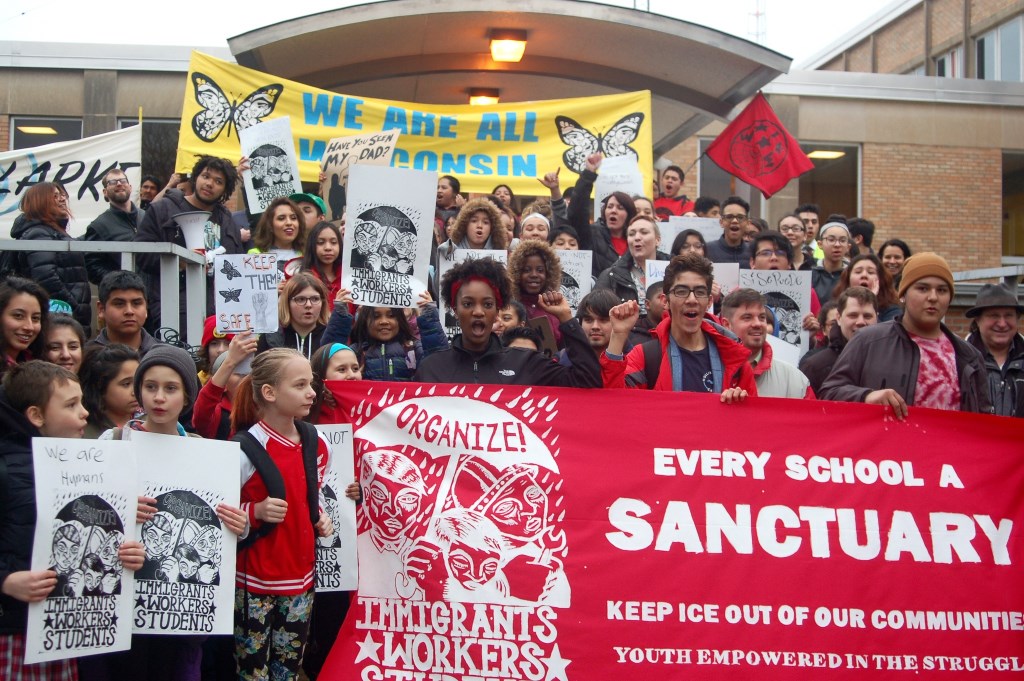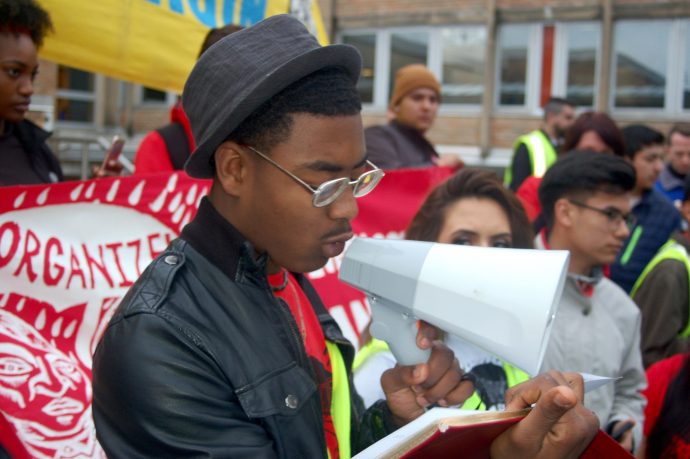Every School A Sanctuary
Immigrant students organize to create safe havens in MPS schools.

Resolution supporters rally on the steps of MPS’ central administration building. Photo by Andrea Waxman.
The emotion in the packed room was palpable as more that 40 speakers stood before the Milwaukee Board of School Directors to speak in favor of a resolution to designate the district a safe haven for undocumented immigrant students and their families.
Students, parents, alumni, teachers, staff and city residents raised concerns about the security and psychological well–being of MPS students, and talked of American ideals of inclusivity, the country’s history of immigration, law, leadership and, most of all, their own family stories of struggle and sacrifice. Just one speaker opposed the resolution.
Emily Z told of how hard her parents work to provide for her and her younger brother. In tears, she said they fear being stopped by Immigration and Customs Enforcement (ICE).
“Our parents want us to be the (people) that they wish they could be. They want us to have a chance here.”
Many of the students who testified were members of Youth Empowered in the Struggle (YES!), the youth division of immigrants rights organization Voces De La Frontera. YES! was a driving force behind the resolution, said Cendi Trujillo, Voces De La Frontera’s youth organizer. The 100–plus members of the Milwaukee branch had been working on the resolution since shortly after the November election, Tujillo explained.
School board member Tatiana Joseph, herself a formerly undocumented child, said she worked with YES! and several other organizations to draft the resolution that calls for Milwaukee Public Schools to protect immigrant students and refugees. Joseph and board Vice Chairman Larry Miller co-sponsored the resolution.
In addition to discussing the resolution at their schools, YES! members sought input from an advisory group of stakeholders including teachers, administrators and parents. In early March, they invited the full school board to the Voces De La Frontera offices, where they explained the resolution, shared their personal stories and asked for a commitment of support, Trujillo said.
More than 100 people staged a pre-vote march and rally at the MPS central administration building, 5225 W. Vliet St. Student speakers told the crowd about the difficulties they have faced as immigrants and refugees and called for support of all students.
Farok Rashid, 16, a Rohingya refugee from Burma, arrived in the U.S. three years ago. Explaining that his parents died of AIDS before he left a refugee camp in Malaysia, Rashid detailed some of his struggles there including severe bullying.
After the vote, the South Division High School student said that though he participates in many extracurricular activities that help others, this is the first time he has joined a protest or taken political action. “I am very happy and proud of myself and everyone else,” Rashid said.
Romeo Johnnies, a junior at Alliance High School, read an original poem. Though he is not an immigrant himself, Johnnies belongs to YES! and has marched in support of Black Lives Matter and against the takeover of MPS last year, he said.
“I believe everybody, no matter who you are or what race you are, or where you’re from or what your background is, should have equal rights … I believe if we are called the land of the free then we should all be free,” Johnnies said.
After the unanimous board vote to pass the resolution, the elated students gathered in the building lobby to share their happiness and relief and document the moment with group photos.
“I feel happy because they’re understanding where we are coming from,” said YES! member Brandon Fragosa, a junior at Ronald Reagan High School, adding that he hopes that this message of inclusion by MPS will spread to other parts of American society.
Trujillo noted that at several points the students questioned whether the work and emotional effort of the campaign was worth it. “Having to put yourself in a position where you are vulnerable is a huge step. For a lot of them, it was the first time sharing their stories or their parents’ stories,” she said, adding that the experience helped them feel empowered. Now they are asking themselves, ‘What’s next? What else are we capable of doing?’” Trujillo said.
The resolution, which Trujillo and Voces De La Frontera Executive Director Christine Neumann-Ortiz say will not cost the district financially, includes a provision that MPS schools will refuse to cooperate with ICE (U.S. Immigration and Customs Enforcement) by not allowing them on school premises or sharing students’ confidential information. It also calls for creating a rapid response plan in case of a raid involving parents or guardians, and connecting students and their families to legal, social and medical services as needed.
The district’s next steps include establishing an immigration resource center in every school and developing procedures defining the appropriate steps to take if law enforcement comes to a school, according to an MPS release.
This story was originally published by Milwaukee Neighborhood News Service, where you can find other stories reporting on fifteen city neighborhoods in Milwaukee.






















Hats off to these young people for speaking about their concerns so publicly and intelligently. Unfortunately a resolution like this may be giving false hope to children rather than helping them understand how they actually might be affected by the current immigration laws. In fact, there are no sanctuary cities or school districts. The Federal government is responsible for enforcing immigration laws and schools would be required to participate in the legal process. “Removals” of illegal immigrants peaked during the Obama administration in 2012 and then has reduced somewhat as the election year approached while candidates pandered to concerned voter segments. Almost all of the removals within the country (not at boarders) are focused on criminals and when children of removed parents are involved they are placed in Health Human Services custody which requires them, like in cases of other orphans or refugees, to act in the best interest of the child. This can often put the child in the best position to gain citizenship. Does MPS really want to promote the benign policy of an uncooperative “sanctuary”, rather than helping to educate and place the child through a process which is in place and can be improved by their cooperation?